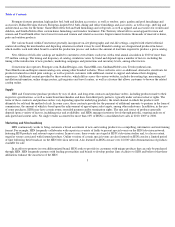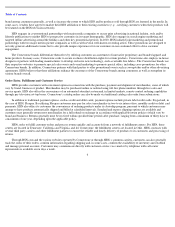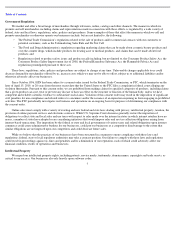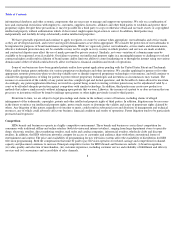Home Shopping Network 2010 Annual Report Download - page 18
Download and view the complete annual report
Please find page 18 of the 2010 Home Shopping Network annual report below. You can navigate through the pages in the report by either clicking on the pages listed below, or by using the keyword search tool below to find specific information within the annual report.
Table of Contents
We may fail to protect our intellectual property rights within the full scope and manner available to us under applicable law or statute
or may be accused of infringing upon the intellectual property rights of third parties.
We regard our intellectual property rights, including patents, service marks, trademarks and domain names, copyrights and trade secrets, as
critical to our success. We rely heavily upon software codes, informational databases and other systemic components that are necessary to
manage and support our business operations.
From time to time, we are subject to legal proceedings and claims in the ordinary course of business, including claims of alleged
infringement of the trademarks, copyrights, patents and other intellectual property rights of third parties. In addition, litigation may be necessary
in the future to enforce our intellectual property rights, protect trade secrets or to determine the validity and scope of proprietary rights claimed
by others. Any litigation of this nature, regardless of outcome or merit, could result in substantial costs and diversion of management and
technical resources, any of which could adversely affect our business, financial condition and results of operations. Patent litigation tends to be
particularly protracted and expensive. Our failure to protect our intellectual property rights in a meaningful manner or challenges to related
contractual rights could result in erosion of brand names and limit our ability to control marketing on or through the internet using our various
domain names or otherwise, which could adversely affect our business, financial condition and results of operations.
Restrictive covenants in our debt instruments could limit our flexibility in responding to current market conditions or otherwise restrict
our business activities.
The existence of, and limitations on the availability of our debt could have important consequences. The existence of debt could, among
other things:
Limitations imposed as a part of the debt, such as the availability of credit and the existence of restrictive covenants may, among other
things, make it difficult for us to satisfy our financial obligations; and/or limit our ability to respond to business opportunities. The credit
agreement relating to our credit facility and indenture with respect to the senior notes do include restrictive covenants, financial and non-
financial.
Risks Related to Our Common Stock
The shareholders’ rights plan adopted by the Board of Directors in December 2008 may inhibit takeovers that would otherwise be
beneficial to shareholders.
In the fourth quarter of 2008, our Board of Directors approved the creation of a Series A Junior Participating Preferred Stock, adopted a
shareholders’ rights plan and declared a dividend of one right for each outstanding share of common stock held by our shareholders. Initially,
these rights, which trade with the shares of our common stock, are not exercisable. Under the rights plan, these rights will be exercisable if a
person or group acquires or commences a tender or exchange offer for 15% or more of our common stock (except for certain grandfathered
persons to which higher thresholds apply). If the rights become exercisable, each right will permit the holder, other than the “acquiring person,”
to purchase from us shares of common stock at a 50% discount to the then prevailing market price. As a result, the rights will cause substantial
dilution to a person or group that becomes an “acquiring person” on terms not approved by our Board of Directors. The existence of these rights
may prevent, discourage or delay an acquisition of us, even if such acquisition would be beneficial to our shareholders.
15
•
require a substantial portion of our cash flow from operations to be dedicated to the payment of principal and interest on our
indebtedness;
•
limit our ability to use cash flow or obtain additional financing for future working capital, capital expenditures or other general
corporate purposes;
•
increase our vulnerability to general economic and industry conditions; or
•
expose us to the risk of increased interest rates because certain of our borrowings, including borrowings under our credit facilities,
are at variable interest rates.
























